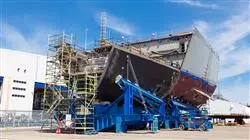University certificate
The world's largest faculty of engineering”
Introduction to the Program
The conceptual design of a ship is an aspect of utmost importance, since it provides a higher level of detail. At TECH, we want to offer you the best education so you can update your knowledge in the field”

The Postgraduate certificate in Conceptual Naval Engineering is a program of the highest academic level that aims to educate professionals in the field, enabling them to carry out their work with the highest quality and safety requirements. It is a very complete program imparted by professionals with years of experience, and which includes the latest advances in the field.
Conceptual design is an engineering effort that provides much more detail than preliminary design. It is a second iteration in the design process. For those who think of ship design in terms of the design spiral, it belongs to the second circuit of the spiral, which is intended to converge on a more accurate and improved set of ship characteristics.
This design must provide sufficient detail to allow verification of the technical and economic feasibility of the vessel. This level of detail is sufficient to make an estimate of construction costs. Typically, this requires the main dimensions, weight estimate, type of main engines and any special features of the vessel, which also significantly affect construction such as cargo handling equipment, tank coatings, stabilization systems, etc.
Further, it provides details to estimate operating costs, based on information such as crew number, fuel and lube oil consumption, and an estimate of maintenance costs based on equipment. However, it also provides sufficient information to make estimates of revenue generating capacity, based on deadweight or other load capacity estimates and calculations.
Conceptual design enables assessment of the technical feasibility of the vessel. Compatibility and stowage of cargoes can be verified, the vessel’s ability to operate under various loading conditions, the defined level of automation can be correlated with crew size, and assumed or intended designations. It is, therefore, a highly specialized program that will allow student to increase their capabilities in the field.
It should be noted that since this is a 100% online Postgraduate certificate, students are not constrained by fixed schedules or commutes, but can access the contents at any time of the day, balancing their work or personal life with their academic life.
The completion of this Postgraduate certificate will place Naval Engineering professionals at the forefront of the latest developments in the sector"
This Postgraduate certificate in Conceptual Naval Engineering contains the most complete and up-to-date program on the market. The most important features include:
- Case studies presented by experts in Naval Engineering
- The graphic, schematic, and practical contents with which they are created, provide scientific and practical information on the disciplines that are essential for professional practice
- Practical exercises where self-assessment can be used to improve learning
- Special emphasis on innovative methodologies in Conceptual Naval Engineering
- Theoretical lessons, questions to the expert, debate forums on controversial topics, and individual reflection assignments
- Content that is accessible from any fixed or portable device with an Internet connection
This Postgraduate certificate is the best investment you can make when selecting a refresher program in Conceptual Naval Engineering. We offer you quality and open access to content"
The teaching staff includes professionals in naval engineering, who bring their experience to this program, as well as renowned specialists from leading societies and prestigious universities.
Its multimedia content, developed with the latest educational technology, will provide the professional with situated and contextual learning, i.e. a simulated environment that will provide an immersive education programmed to learn in real situations.
This program is designed around Problem-Based Learning, whereby the professional must try to solve the different professional practice situations that arise throughout the program. For this purpose, professionals will be assisted by an innovative, interactive video system created by renowned and extensively experienced experts in Conceptual Naval Engineering.
This program comes with the best educational material, providing you with a contextual approach that will facilitate your learning"

This 100% online Postgraduate certificate will allow you to combine your studies with your professional work. You choose where and when to train"
Why study at TECH?
TECH is the world’s largest online university. With an impressive catalog of more than 14,000 university programs available in 11 languages, it is positioned as a leader in employability, with a 99% job placement rate. In addition, it relies on an enormous faculty of more than 6,000 professors of the highest international renown.

Study at the world's largest online university and guarantee your professional success. The future starts at TECH”
The world’s best online university according to FORBES
The prestigious Forbes magazine, specialized in business and finance, has highlighted TECH as “the world's best online university” This is what they have recently stated in an article in their digital edition in which they echo the success story of this institution, “thanks to the academic offer it provides, the selection of its teaching staff, and an innovative learning method aimed at educating the professionals of the future”
A revolutionary study method, a cutting-edge faculty and a practical focus: the key to TECH's success.
The most complete study plans on the university scene
TECH offers the most complete study plans on the university scene, with syllabuses that cover fundamental concepts and, at the same time, the main scientific advances in their specific scientific areas. In addition, these programs are continuously being updated to guarantee students the academic vanguard and the most in-demand professional skills. In this way, the university's qualifications provide its graduates with a significant advantage to propel their careers to success.
TECH offers the most comprehensive and intensive study plans on the current university scene.
A world-class teaching staff
TECH's teaching staff is made up of more than 6,000 professors with the highest international recognition. Professors, researchers and top executives of multinational companies, including Isaiah Covington, performance coach of the Boston Celtics; Magda Romanska, principal investigator at Harvard MetaLAB; Ignacio Wistumba, chairman of the department of translational molecular pathology at MD Anderson Cancer Center; and D.W. Pine, creative director of TIME magazine, among others.
Internationally renowned experts, specialized in different branches of Health, Technology, Communication and Business, form part of the TECH faculty.
A unique learning method
TECH is the first university to use Relearning in all its programs. It is the best online learning methodology, accredited with international teaching quality certifications, provided by prestigious educational agencies. In addition, this disruptive educational model is complemented with the “Case Method”, thereby setting up a unique online teaching strategy. Innovative teaching resources are also implemented, including detailed videos, infographics and interactive summaries.
TECH combines Relearning and the Case Method in all its university programs to guarantee excellent theoretical and practical learning, studying whenever and wherever you want.
The world's largest online university
TECH is the world’s largest online university. We are the largest educational institution, with the best and widest online educational catalog, one hundred percent online and covering the vast majority of areas of knowledge. We offer a large selection of our own degrees and accredited online undergraduate and postgraduate degrees. In total, more than 14,000 university degrees, in eleven different languages, make us the largest educational largest in the world.
TECH has the world's most extensive catalog of academic and official programs, available in more than 11 languages.
Google Premier Partner
The American technology giant has awarded TECH the Google Google Premier Partner badge. This award, which is only available to 3% of the world's companies, highlights the efficient, flexible and tailored experience that this university provides to students. The recognition as a Google Premier Partner not only accredits the maximum rigor, performance and investment in TECH's digital infrastructures, but also places this university as one of the world's leading technology companies.
Google has positioned TECH in the top 3% of the world's most important technology companies by awarding it its Google Premier Partner badge.
The official online university of the NBA
TECH is the official online university of the NBA. Thanks to our agreement with the biggest league in basketball, we offer our students exclusive university programs, as well as a wide variety of educational resources focused on the business of the league and other areas of the sports industry. Each program is made up of a uniquely designed syllabus and features exceptional guest hosts: professionals with a distinguished sports background who will offer their expertise on the most relevant topics.
TECH has been selected by the NBA, the world's top basketball league, as its official online university.
The top-rated university by its students
Students have positioned TECH as the world's top-rated university on the main review websites, with a highest rating of 4.9 out of 5, obtained from more than 1,000 reviews. These results consolidate TECH as the benchmark university institution at an international level, reflecting the excellence and positive impact of its educational model.” reflecting the excellence and positive impact of its educational model.”
TECH is the world’s top-rated university by its students.
Leaders in employability
TECH has managed to become the leading university in employability. 99% of its students obtain jobs in the academic field they have studied, within one year of completing any of the university's programs. A similar number achieve immediate career enhancement. All this thanks to a study methodology that bases its effectiveness on the acquisition of practical skills, which are absolutely necessary for professional development.
99% of TECH graduates find a job within a year of completing their studies.
Postgraduate Certificate in Conceptual Naval Engineering
At TECH Global University we designed the most complete and updated Postgraduate Certificate in Conceptual Naval Engineering in the educational market as an opportunity to expand the academic horizon of all professionals with the intention of achieving work excellence. Our program has an innovative curriculum that will provide students with the necessary knowledge to competently lead large-scale projects. In addition, with the new knowledge acquired, the professional will be able to solve complex problems, controlling the processes of construction, repair, transformation, maintenance and inspection of the designated infrastructures.
Postgraduate Certificate in Conceptual Naval Engineering 100% online
At TECH we have an experienced and qualified faculty in the field of naval engineering. Thanks to this, students will learn from experts the thematic axes related to structure, machinery, regulation and hydrodynamics, among other topics of utmost importance to consolidate multidisciplinary. In addition, throughout the program we will provide students with the necessary skills to properly manage the work team at their disposal and thus ensure a work with the highest quality standards. Moreover, upon successful completion of the proposed conceptual areas, the professional will be awarded a university degree in Conceptual Naval Engineering, along with a diploma of international recognition.







